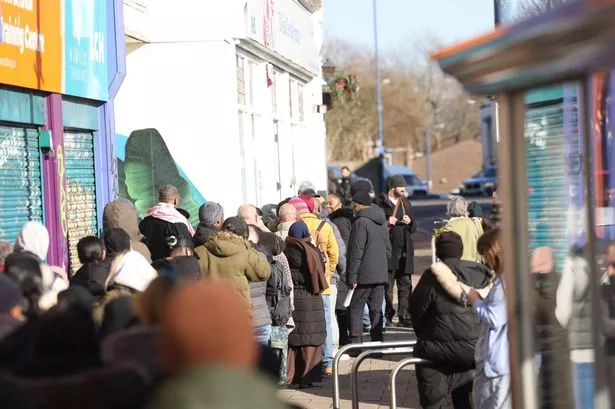The problems with access in the city have not improved since chaotic scenes in February 2024 Hundreds of people queued outside St Pauls Dentists after the practice announced they would be accepting 100 more NHS patients, in scenes which could be repeated this weekend(Image: Paul Gillis/Bristol Post)
Hundreds of people queued outside St Pauls Dentists after the practice announced they would be accepting 100 more NHS patients, in scenes which could be repeated this weekend(Image: Paul Gillis/Bristol Post)
Lodge Causeway Dental Practice is set to open its doors to new NHS patients today (Saturday) as Bristol battles an ongoing crisis in access to dental care. Another practice – St Pauls Dental – had hundreds of people queueing outside it in February this year when it announced it would be taking on new patients, and similar scenes are expected outside Lodge Causeway.
When St Pauls initially reopened to the public in February 2024, the situation was even worse as thousands of people gathered outside the clinic. Many of them were elderly or disabled, and queues were seen for several days.
During a visit to Bristol in February this year, Prime Minister Sir Keir Starmer said the scenes witnessed in St Pauls had provided the impetus for change, but warned the process would take time.
“I said that if we were to win the election, we would put into place the 700,000 urgent appointments for the NHS,” he said. “I said that we would recruit NHS dentists in the ‘deserts’ where you can’t get a NHS dentist. We’ve started the recruitment of that and I said that we’d change the dentist contract and we are working on that.
“I promised those three steps and we are delivering on those three steps, it’ll take time to turn it around but I was really struck by that queue in Bristol last year and that’s why we made the commitment.”
Many patients in so-called dental deserts where no care is available are forced to either go to A&E for urgent work or through the expensive private sector, if they are lucky enough to be able to afford it. A British Dental Association (BDA) spokesperson said the situation had not improved in recent months.
“Earlier this year, we saw desperate patients in Bristol queuing in the cold for hours in the hope of getting an NHS appointment when St Paul’s Dental Practice opened its door to new patients,” the spokesperson said. “Some families had travelled hundreds of miles just to get a spot in the queue.
“There’s no indication that the situation has improved much since then as it’s estimated that as many as one in four people in Bristol have unmet NHS dental needs. Recent polling suggests that among those who could not get an NHS dental appointment, more than a quarter (26%) have resorted to DIY dentistry, while 19% went abroad for treatment.”
The crisis in NHS dentistry can be broadly divided into two categories: deep, structural issues with the system, and short-term problems such as access to urgent care appointments. The situation has not been helped by the fact that thousands of dentists are believed to have left the profession since the onset of the covid-19 pandemic.
In February, Labour announced 700,000 new urgent appointments would be made available. The scenes outside St Pauls Dental in 2024 were directly referenced by the government as a factor in this decision.
The more deep-rooted issues within the NHS dental system are complex and stretch back across decades, and governments of both Labour and Conservative vintage, all the way back to the introduction of NHS dental charges in 1951.
More dentists going private
In a nutshell, the current system does not provide dentists with enough incentive or conditions amenable to taking on new NHS patients. With more dentists going private, people who can’t afford to pay private fees go without care and end up in A&E, or even taking care into their own hands.
In July, the government announced a swathe of broader changes in order to fix the “broken NHS dental system”. Newly qualified dentists could be made to work in the NHS for three years to boost the number of appointments.
Plans also included a requirement for dentists to deliver a set amount of urgent and unscheduled care each year. A new, special course of treatment for patients with severe gum disease or with at least five teeth with tooth decay and more money for denture modifications were also part of the dental contract reforms.
Ministers hoped the reforms will incentivise dentists to take on the most complicated cases, often dealt with at a loss under the current system. The Department of Health and Social Care said it will also bring in robust preventative measures for children’s teeth, including better use of tooth resin sealants for children with a history of dental decay and applying fluoride varnish without a full dental check-up.
The changes were put to consultation, which closed on August 19. The consultation is currently being reviewed with changes likely to be in force from April 2026.
“NHS dentistry remains at death’s door,” the BDA spokesperson said. “The BDA agrees with the findings of a recent Public Accounts Committee inquiry that meaningful reform of a failed dental contract is needed. We also agree that such reform must go hand in hand with sustainable funding.”
The spokesperson said they were still waiting for the government to show it recognised the scale of the problem, and the money required to fix it.
“We are ready to work at pace with Ministers to ensure the reform and funding are in place to give NHS dentistry a future. However, there’s still no evidence the resources will be brought to bear to restore care to millions.”
“The Government urgently needs to match its words on NHS dentistry with action to save the service.”
